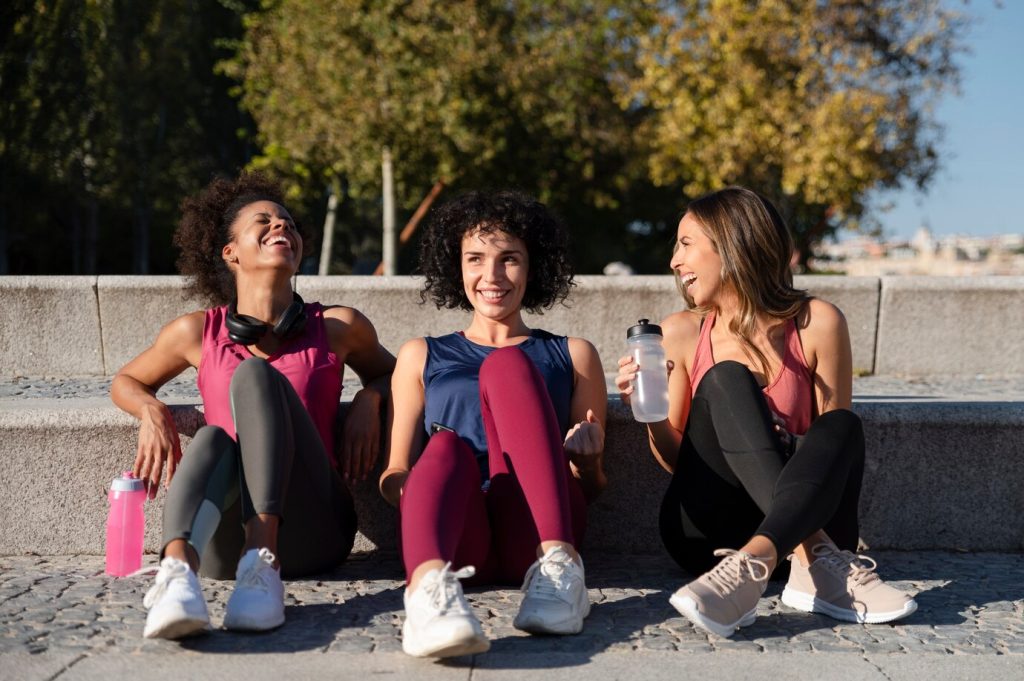No matter your age, exercise is one of the best ways to enhance your health and well-being.
When thinking about health, we often focus on doctor visits, screenings, and preventive care. But there are many other factors we can control, like improving our diet, managing stress, and incorporating more movement into our daily lives. Exercise is one of the most effective tools we have to enhance our health and prevent disease.
According to the American Academy of Family Physicians, regular exercise offers numerous health benefits—such as lowering blood pressure, reducing cholesterol, and improving mood and cognitive function. For women, exercise provides additional benefits due to their unique hormonal makeup and specific health risks. Here are four reasons why exercise is especially beneficial for women.
1. Helps Manage Mood Swings
From puberty through menopause, women experience fluctuations in estrogen and progesterone that can affect their brain chemistry and mood. When estrogen levels drop, such as before or during menstruation or during menopause, women lose a key source of serotonin, the brain’s “feel-good” chemical. This can lead to mood swings, anxiety, or even depression.
Exercise combats these hormone-driven mood changes by releasing endorphins—natural mood boosters. Often referred to as the “runner’s high,” these endorphins create feelings of happiness and relaxation after physical activity. Even post-menopause, when estrogen levels decrease, regular exercise can significantly improve mood. One study of postmenopausal women with anxiety and depression found that those who exercised experienced an 18–22% improvement in symptoms, compared to no improvement in those who did not exercise.
2. Prevents Bone Loss and Osteoporosis
Women are at a higher risk than men of developing osteoporosis, which leads to brittle bones and increased risk of fractures as they age. According to the Office on Women’s Health, 8 million of the 10 million Americans with osteoporosis are women, and half of women over 50 with osteoporosis will experience a bone fracture. This is due to thinner bones and the loss of estrogen, which contributes to bone density loss.
Exercise is one of the best ways to strengthen bones and prevent osteoporosis, especially when started early in life. Weight-bearing exercises like hiking, jogging, or tennis help build bone mass, while strength training exercises like weightlifting or resistance bands improve bone health and prevent falls. It’s important to consult with a doctor or exercise professional to ensure you’re doing exercises that are safe and effective for your age and condition.
3. Helps Manage Weight
While weight gain is a common part of aging for both men and women, women face unique challenges. Pregnancy weight can linger long after childbirth, and menopause brings additional weight gain due to a decrease in estrogen, which shifts fat distribution to the abdominal area. As women age, muscle mass decreases, making it harder to maintain or lose weight since muscle burns more calories than fat.
Exercise can help by building and maintaining lean muscle mass, which keeps metabolism active and burns calories. A study from Northwestern University over 20 years showed that while all participants gained weight as they aged, those who exercised gained significantly less. On average, women who exercised gained 13 pounds less than their inactive counterparts.
4. Improves Sleep
Quality sleep is essential for overall well-being, including mental health. Research from the University of Bern suggests that during sleep, the brain strengthens positive emotions while processing negative ones. Exercise plays a key role in improving sleep patterns, as it helps you fall asleep faster and stay asleep longer.
A 2020 study showed that exercise improved sleep quality in sedentary middle-aged adults. Participants who followed physical activity guidelines reported longer sleep duration, falling asleep faster, and experiencing fewer interruptions during the night. Whether you’re doing moderate exercise or high-intensity workouts, exercise is a great way to improve sleep and overall energy levels.
Getting Started
Despite all the benefits of exercise, some women may struggle to find the time or energy to stay active regularly. The key is starting with small, achievable goals. It’s not about immediate results but the long-term health benefits that come with consistency. Find a workout buddy or a personal trainer to help keep you motivated, and remember that every step you take brings you closer to better health.
Talk to your OB/GYN or primary care provider to learn how to incorporate exercise into your daily routine, and start reaping the many benefits today!

